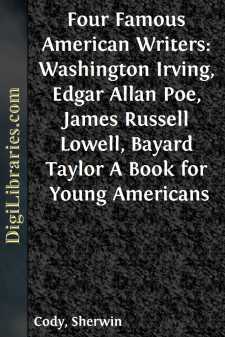Categories
- Antiques & Collectibles 13
- Architecture 36
- Art 48
- Bibles 22
- Biography & Autobiography 813
- Body, Mind & Spirit 142
- Business & Economics 28
- Children's Books 17
- Children's Fiction 14
- Computers 4
- Cooking 94
- Crafts & Hobbies 4
- Drama 346
- Education 46
- Family & Relationships 57
- Fiction 11829
- Games 19
- Gardening 17
- Health & Fitness 34
- History 1377
- House & Home 1
- Humor 147
- Juvenile Fiction 1873
- Juvenile Nonfiction 202
- Language Arts & Disciplines 88
- Law 16
- Literary Collections 686
- Literary Criticism 179
- Mathematics 13
- Medical 41
- Music 40
- Nature 179
- Non-Classifiable 1768
- Performing Arts 7
- Periodicals 1453
- Philosophy 64
- Photography 2
- Poetry 896
- Political Science 203
- Psychology 42
- Reference 154
- Religion 513
- Science 126
- Self-Help 84
- Social Science 81
- Sports & Recreation 34
- Study Aids 3
- Technology & Engineering 59
- Transportation 23
- Travel 463
- True Crime 29
Four Famous American Writers: Washington Irving, Edgar Allan Poe, James Russell Lowell, Bayard Taylor A Book for Young Americans
by: Sherwin Cody
Categories:
Description:
Excerpt
CHAPTER I
HIS CHILDHOOD
The Revolutionary War was over. The British soldiers were preparing to embark on their ships and sail back over the ocean, and General Washington would soon enter New York city at the head of the American army. While all true patriots were rejoicing at this happy turn of affairs, a little boy was born who was destined to be the first great American author.
William Irving, the father of this little boy, had been a merchant in New York city. He had been very prosperous until the war broke out. After the battle of Long Island, the British then occupying the city, he had taken his family to New Jersey. But later, although he was a loyal American, he went back to the city to attend to his business. There he helped the American cause by doing everything he could for the American prisoners whom the British held. His wife, especially, had a happy way of persuading Sir Henry Clinton, and when the British general saw her coming, he prepared himself to grant any request about the prisoners which she might make. Often she sent them food from her own table, and cared for them when they were sick.
When their last son, the eleventh child, was born, on April 3, 1783, the parents showed their loyalty by naming him Washington, after the beloved Father of his Country.
Six years after this, George Washington was elected president, and went to New York to live. The Scotch maid who took care of little Washington Irving made up her mind to introduce the boy to his great namesake. So one day she followed the general into a shop, and, pointing to the lad, said, "Please, your honor, here's a bairn was named after you." Washington turned around, smiled, and placing his hand on the boy's head, gave him his blessing. Little did General Washington suspect that in later years this boy, grown to manhood and become famous, would write his biography.
In those days New York was only a small town at the south end of Manhattan Island. It extended barely as far north as the place where now stand the City Hall and the Postoffice. Broadway was then a country road. The Irvings lived at 131 William Street, afterward moving across to 128. This is now one of the oldest parts of New York. The streets in that section are narrow, and the buildings, though put up long after Irving's birth, seem very old.
Here the little boy grew up with his brothers and sisters. At four he went to school. His first teacher was a lady; but he was soon transferred to a school kept by an old Revolutionary soldier who became so fond of the boy that he gave him the pet name of "General." This teacher liked him because, though often in mischief, he never tried to protect himself by telling a falsehood, but always confessed the truth.
Washington was not very fond of study, but he was a great reader. At eleven his favorite stories were "Robinson Crusoe" and "Sindbad the Sailor." Besides these, he read many books of travel, and soon found himself wishing that he might go to sea. As he grew up he was able to gratify his taste for travel, and some of his finest books and stories relate to his experiences in foreign lands....


